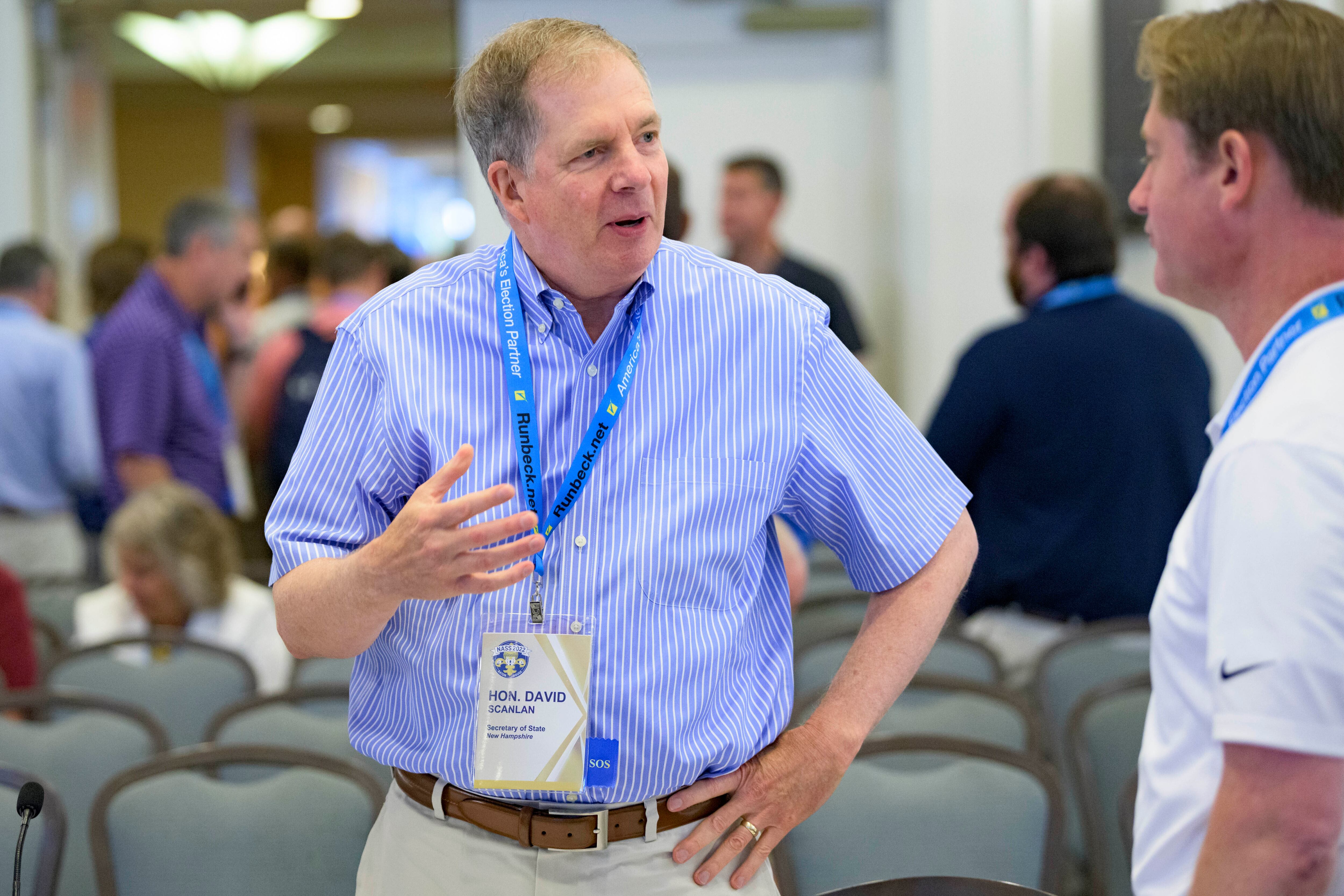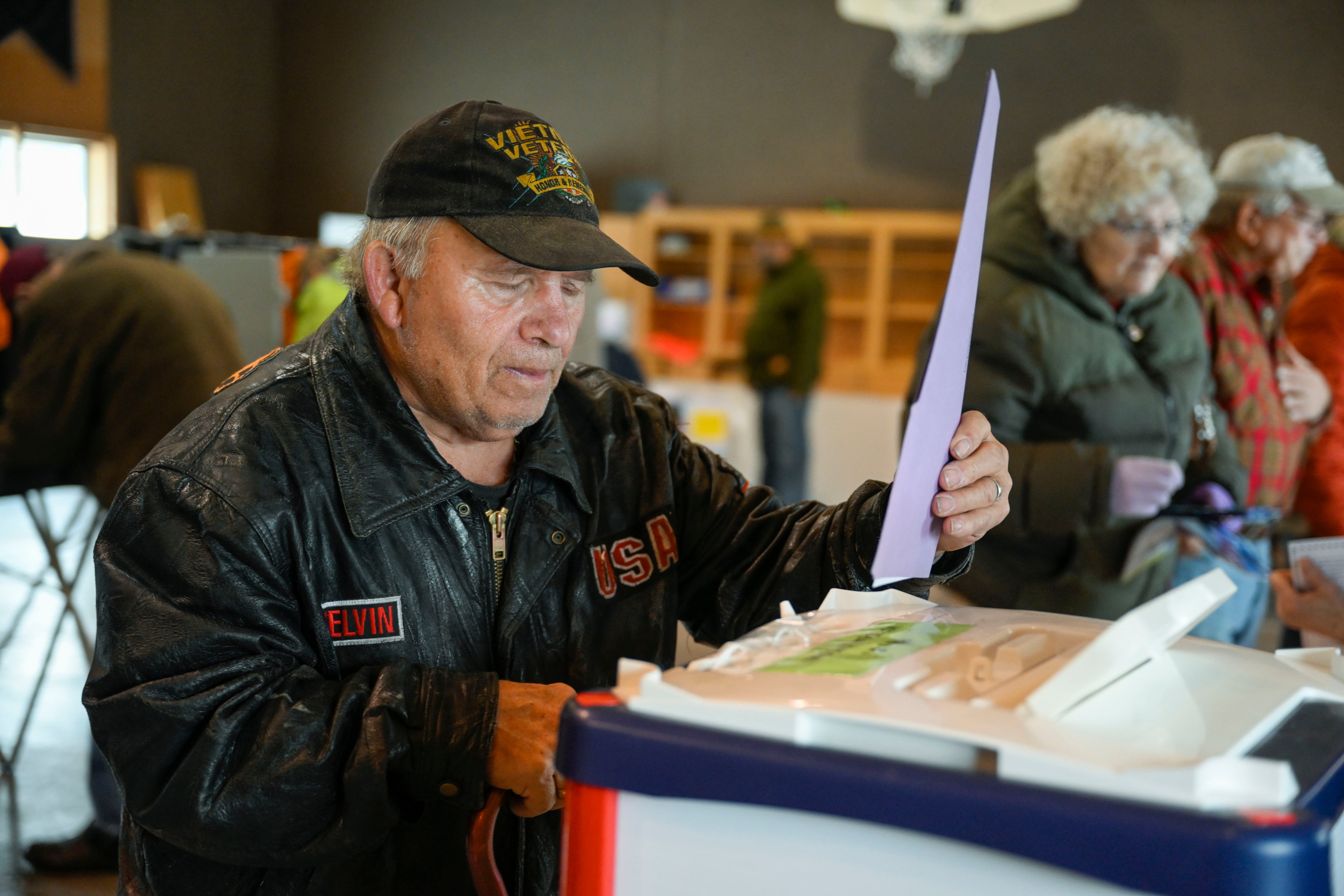Running an election used to be a “sleepy” practice, said New Hampshire Secretary of State David Scanlan, who has helped organize elections in his state for over 20 years. Voters trusted the process, and for the most part had faith in the outcomes.
That’s changed over the past decade, with the increased spread of falsehoods about election integrity leading to a loss of confidence among voters, Scanlan said. His proposed solution? Bring one of America’s most trusted communities into the process: enlist veterans and military spouses to help organize and watch the vote.
Misinformation about elections reached a climax in 2020, when former President Donald Trump and his supporters falsely claimed he lost because of widespread voter fraud. New Hampshire was one of many states Trump targeted with claims of election fraud that were later investigated and rejected by officials he had appointed. He contended that his loss in the state was due to voter fraud in the town of Windham – an assertion that was debunked through a forensic audit. Still, hundreds of people sent messages of outrage to election officials in the suburban town.
Scanlan, a Republican, blames rhetoric from both political parties for the now widespread distrust in the voting process.
“The issue of misinformation has been growing,” Scanlan said. “We saw it nationally first, where there was a loss of confidence in elections because of messaging from top elected officials in both parties. That has filtered into New Hampshire as well.”
To fortify New Hampshire voters against misinformation in the lead-up to the 2024 presidential election, Scanlan is working with We the Veterans, a non-partisan nonprofit that recruited 63,000 veterans and military family members to work the polls during the 2022 midterms through its Vet the Vote campaign.
Scanlan wants to encourage New Hampshire veterans to volunteer during the 2024 election. He’s also embarking on a plan to educate veterans about the voting process in the state, with the hope that they spread the message to their communities. The idea is to use their trusted status in society to guard against unsubstantiated claims of vote tampering.
“We want to use the opportunity to educate voters generally, and to do that through veterans,” Scanlan said. “They can talk to people in their community, and because of the roles they have played, they’re respected. People look up to veterans.”

Through the initiative, We the Veterans will use its vast network to contact veterans in New Hampshire and try to get them interested in the election process.
The group, anticipating election misinformation and a shortage of poll workers in 2024, is already coordinating efforts to recruit veterans and military families to volunteer for the next presidential election. New Hampshire is one of five states where We the Veterans has launched campaigns so far. To fund this initiative, the group works with partners, including the National Football League. The Department of Homeland Security granted We the Veterans $388,500 to fund some of its other efforts, such as educational programs about voting and civic engagement.
“Veterans and military families can be incredibly impactful in the upcoming presidential election to remind Americans that yes, our votes are free and fair, and yes, our elections are secure,” said Ellen Gustafson, a co-founder of We the Veterans. “Especially if the people there making it all happen are people that you trust the most: veterans and military family members.”
In addition to New Hampshire, the group launched initiatives in Michigan, Florida, Nevada and New Jersey. Several localities are also working with the nonprofit, including the city of Dallas; Los Angeles County; Clark County in Nevada; Allegheny County in Pennsylvania; and Maricopa County in Arizona.
We the Veterans is focusing on areas of the country where many veterans live, such as the Los Angeles area, as well as states and counties that were bombarded with election misinformation in 2020. One such place is Maricopa County, where President Joe Biden won in 2020, helping him to clinch the battleground state.
Soon after Arizona was called for Biden, some Republicans pushed to undo the results, claiming the election was stolen from Trump. However, an audit commissioned by Republicans validated Biden’s win. During the midterm elections two years later, elections officials in the county were on guard and aggressively defended against more accusations about the voting process. In their preparations for 2024, they’re seeking assistance from We the Veterans.
“Maricopa obviously has had its challenges with election misinformation,” Gustafson said. “They’ve been a really great partner, and we’re trying to see how we can help.”
Local elections officials across the country, expecting a shortage of poll workers next year, have reached out to Gustafson with pleas for help with recruiting veterans and military family members as soon as possible.
The U.S. experienced a dearth of volunteers in the 2022 midterms, in part because of threats directed at poll workers, Kim Wyman, the senior advisor for election security at the U.S. Cybersecurity and Infrastructure Security Agency, said at the time. The threats aren’t abating. According to an April report by the Brennan Center for Justice, 30% of local elections officials have been abused, harassed or threatened because of their jobs. Over half of officials are concerned that the threats will harm retention and recruitment, the report states.
“Some people are probably thinking, ‘Are you kidding me? You’re recruiting me for a one-day job in 2024 right now?’ Yes, actually, we are,” Gustafson said. “We want to hear what local officials need and be part of the solution, and what we’re hearing is, ‘Please start now.’”

Along with recruiting poll workers, We the Veterans is preparing for 2024 by reaching out to larger swaths of veteran and military communities to educate them about the election processes in their states. While many veterans won’t be able to volunteer as poll workers, they might be willing to learn more about voting and pass on that information to skeptics, Gustafson said.
One of the group’s first attempts at that type of education will happen this September in New Hampshire, when the state will hold a voter education event in collaboration with We the Veterans.
Scanlan’s office is planning to set up a polling place the same way they would during an actual election. Officials will give tours, explaining each step of the process and the checks and balances involved. The state will have a film crew at the event to record everything, and the video will be shared on YouTube in order to reach a larger audience, Scanlan said.
We the Veterans is tasked with getting veterans and military family members to attend the event in New Hampshire. The group is also planning to host more educational events across the country later this year and into 2024.
“We’ll explain the fact that everything that happens in a polling place is observable, and the only thing that’s secret about the election is how an individual marks their ballot,” Scanlan said. “Hopefully, we can engage more people to participate in the election process.”
Scanlan served eight terms in the New Hampshire House of Representatives before joining the Secretary of State’s office in 2002 as deputy secretary. The legislature elected Scanlan as Secretary of State at the start of 2022. One of his first moves was to establish the Commission on Voter Confidence, which traveled the state last year to ask residents how the government could help people have more trust in the election process.
The biggest takeaway from the commission’s work was the need to shed light on how voting works, Scanlan said.
“We have to do a better job with being transparent,” he said. “When the voter either cannot see what’s going on or they don’t understand what’s going on, that causes doubt and allows for conspiracy theories.”
Scanlan is hoping his work ahead of the 2024 election – including his partnership with We the Veterans – will become a model for other states to follow. He’s presenting his methods next week in Washington, D.C., during a conference of the National Association of Secretaries of State.
This story was updated to describe changes in how We the Veterans is using DHS funding.
This story was produced in partnership with Military Veterans in Journalism. Please send tips to MVJ-Tips@militarytimes.com.
Nikki Wentling is a senior editor at Military Times. She's reported on veterans and military communities for nearly a decade and has also covered technology, politics, health care and crime. Her work has earned multiple honors from the National Coalition for Homeless Veterans, the Arkansas Associated Press Managing Editors and others.





